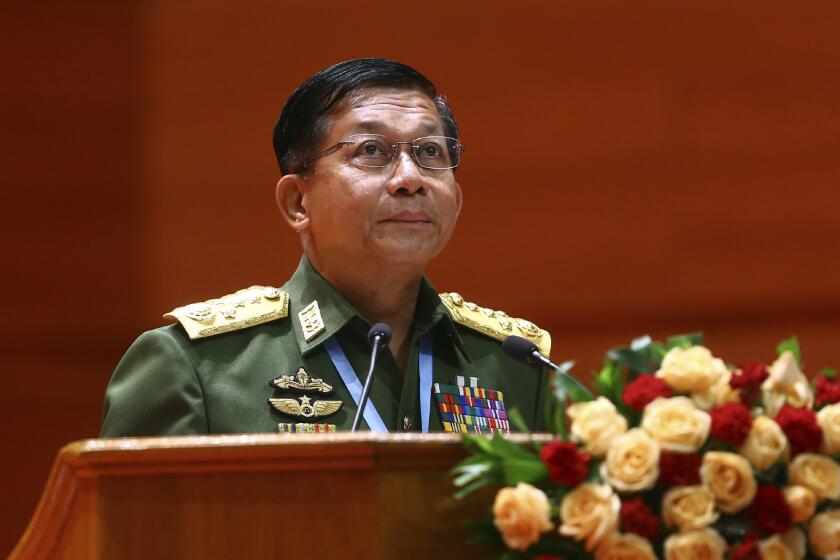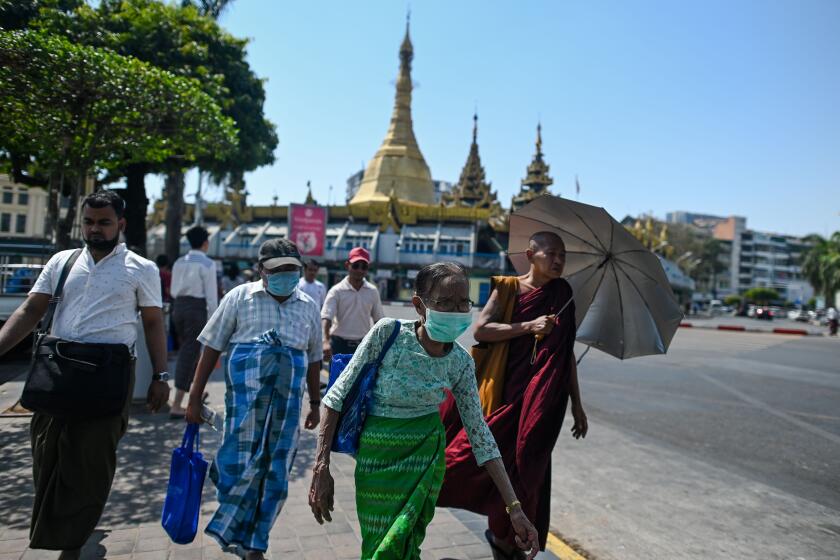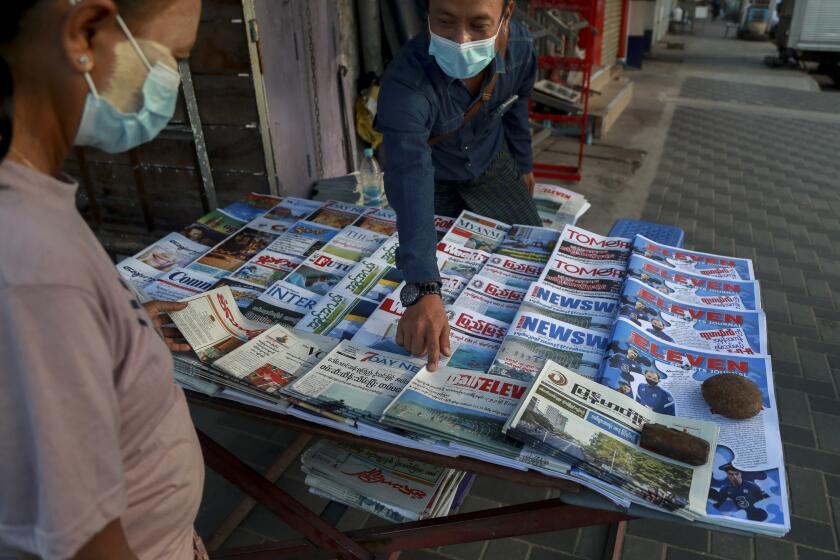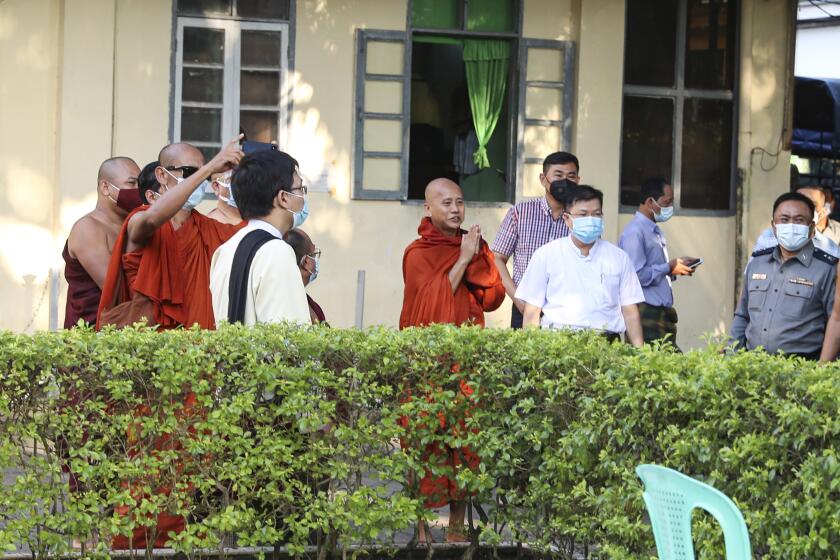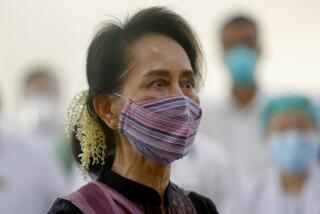Myanmar comes up with charges against Aung San Suu Kyi: Using illegal walkie-talkies
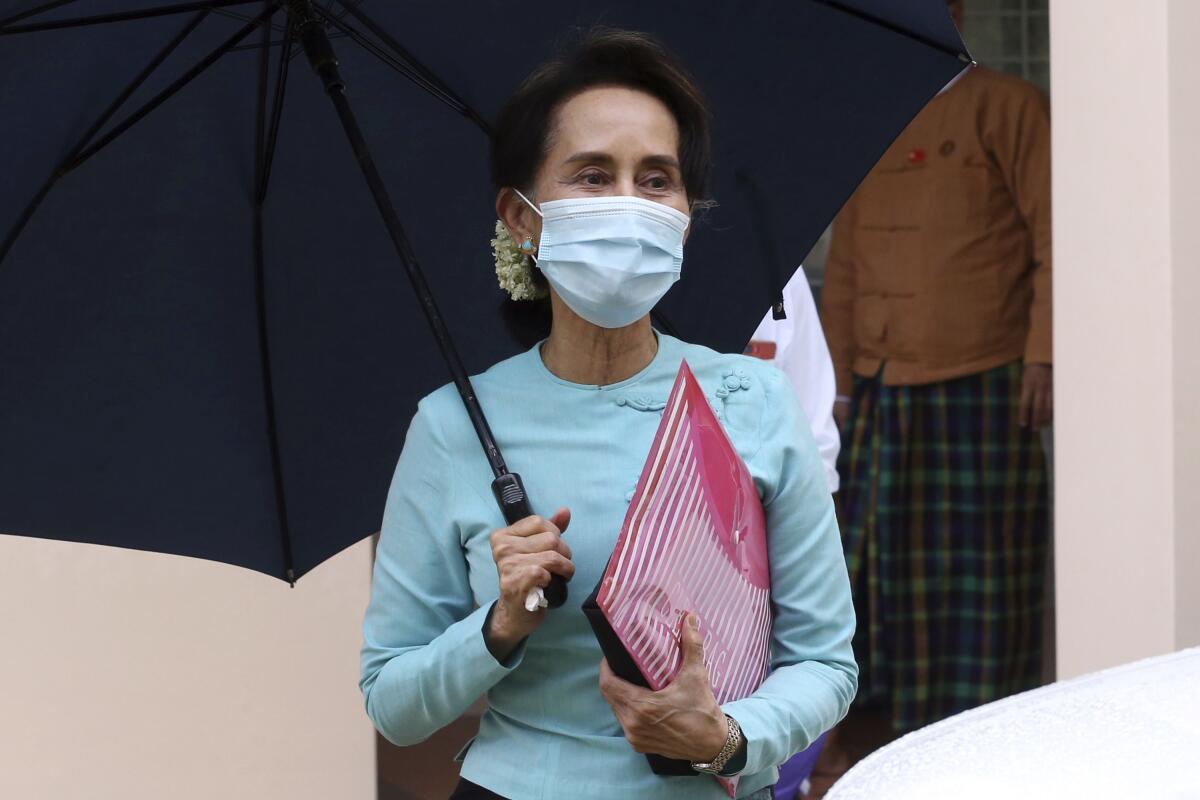
YANGON, Myanmar — Myanmar authorities have charged deposed national leader Aung San Suu Kyi with having several illegally imported walkie-talkies in her home, which allows authorities to hold her until Feb. 15, members of her party said Wednesday.
Suu Kyi was detained along with other senior politicians when Myanmar’s military staged a coup Monday, the day that the newly elected parliament was supposed to open its session. Party officials say she has not been moved from her residence, where she was being held under house arrest.
The charges against Suu Kyi appear to carry a maximum sentence of three years in prison. The charge sheets indicate that the unregistered walkie-talkies were for use by Suu Kyi’s bodyguards.
Kyi Toe, a spokesman for Suu Kyi’s party, the National League for Democracy, confirmed the charge on his Facebook page. He also said the country’s ousted president, Win Myint, was charged with violating natural-disaster management law. An NLD lawmaker, Phyo Zayar Thaw, also confirmed the charges.
Larry Jagan, an independent analyst who specializes in Myanmar, said the charges were little more than a legal fig leaf.
“It was clear that the military were going to look for some legal cases against the leaders of the National League for Democracy, and especially Aung San Suu Kyi, to actually legitimize what they’ve tried to do,” Jagan said. “And that is really a power grab.”
Myanmar’s military already held vast economic and political power. Now it has to govern a country grappling with health and economic crises.
Police and court officials in the capital, Naypyidaw, could not immediately be contacted.
At the same time that authorities were working to keep Suu Kyi in detention, hundreds of lawmakers who had been forced to stay in government housing after the coup were told Wednesday to leave Naypyidaw within 24 hours and go home, said a lawmaker from Suu Kyi’s party who is among the group. He spoke on condition of anonymity because he feared drawing the attention of the military.
The coup was a dramatic backslide for Myanmar, which had been making progress toward democracy, and highlighted the extent to which the generals have ultimately maintained control in the Southeast Asian country.
The military has announced it will hold power under a state of emergency for a year, and then hold elections whose winner will take over the government.
The viral video shows a military convoy storming the gates of parliament in the capital Naypyidaw.
Suu Kyi’s party has called for nonviolent resistance to the military takeover, and on Tuesday night, scores of people in Yangon, Myanmar’s largest city, honked car horns and banged on pots and pans in a protest called by activists. The protest included shouts wishing Suu Kyi good health and calling for freedom.
Medical workers have also declared that they won’t work for the new military government, at a time when the country is battling a steady rise in coronavirus cases. Photos were shared on social media showing health workers with red ribbons pinned to their clothes or holding printed photos of red ribbons.
Supporters of the military have also staged demonstrations, attracting as many as 3,000 people to a Tuesday rally.
Myanmar’s new leader said the new military government plans to investigate alleged fraud in last year’s elections and to prioritize dealing with the country’s coronavirus outbreak and the economy, a state newspaper reported Wednesday.
Five years after emerging from military rule, optimism over Myanmar’s future is sinking over a troubled economy, a tarnished international image and an election that observers say won’t be free or fair.
Senior Gen. Min Aung Hlaing, the country’s top leader, announced the moves Tuesday at the first meeting of the new ruling military junta in the capital, the state-run Global New Light of Myanmar newspaper said.
The military had said one of its reasons for ousting Suu Kyi’s elected civilian government was because it failed to properly investigate the military’s allegations of widespread electoral irregularities in November’s elections. Four days before Monday’s military takeover, the state Union Election Commission had declared there were no significant problems with the vote.
In the November election, Suu Kyi’s party captured 396 out of 476 seats contested in the lower and upper houses of parliament. The main opposition party, the military-backed Union Solidarity and Development Party, won only 33 seats.
When it comes to Myanmar, also known as Burma, a lot is contained in a name.
The military, known as the Tatmadaw, is automatically allocated 25% of the seats in the combined houses under the 2008 constitution that came into effect under a previous military government.
The state newspaper reported that Min Aung Hlaing told Cabinet members that a new Union Election Commission, with what he described as independent and unbiased personnel, “would examine the voting data to find correct results, and actions would be taken accordingly in the process.” He said voter lists would be checked against family household registrations.
Min Aung Hlaing also said that COVID-19 containment measures taken by Suu Kyi’s government would be continued.
Myanmar has confirmed more than 140,600 coronavirus cases, including some 3,100 deaths. Its healthcare infrastructure is one of the weakest in Asia, according to United Nations surveys.
News Alerts
Get breaking news, investigations, analysis and more signature journalism from the Los Angeles Times in your inbox.
You may occasionally receive promotional content from the Los Angeles Times.
The general also urged measures to boost the COVID-19-impacted economy, especially the agricultural sector. About 70% of the country’s population lives in rural areas.
A statement issued Wednesday in the name of the executive members of Suu Kyi’s party said that authorities began raiding the party’s offices in Mandalay and other states and regions Tuesday, seizing documents and computers.
The statement on the Facebook page of party spokesman Kyi Toe said locks were broken at several offices. It denounced the raids as illegal and demanded that they stop.
The military takeover marked a grim development for Suu Kyi, a Nobel Peace Prize laureate who had lived under house arrest for years as she tried to push her country toward democracy. She became its nominal leader after her party won elections in 2015.
A nationalist Buddhist monk in Myanmar noted for his inflammatory anti-Muslim rhetoric has surrendered to police seeking his arrest.
Suu Kyi had been a fierce critic of the army during her years in detention. But after her shift from democracy icon to politician, she worked with the generals, who maintained control of key ministries, guaranteed themselves enough seats in parliament to block any constitutional changes and carried out a brutal repression campaign against the Muslim Rohingya minority.
The coup also presents a test for the international community. President Biden called the military’s actions “a direct assault on the country’s transition to democracy and the rule of law” and threatened new sanctions. The U.N. Security Council held an emergency meeting Tuesday but took no action.
The foreign ministers of the Group of 7 leading industrial nations issued a statement Wednesday calling for Suu Kyi and others to be released, the state of emergency to be scrapped and power restored to the democratically elected government. It also expressed concern about restrictions on information, an apparent reference to cuts to phone and internet service Monday.
“We stand with the people of Myanmar who want to see a democratic future,” said the statement from the group, which comprises the U.S., Canada, Britain, France, Germany, Italy and Japan, along with the European Union.
More to Read
Sign up for Essential California
The most important California stories and recommendations in your inbox every morning.
You may occasionally receive promotional content from the Los Angeles Times.
